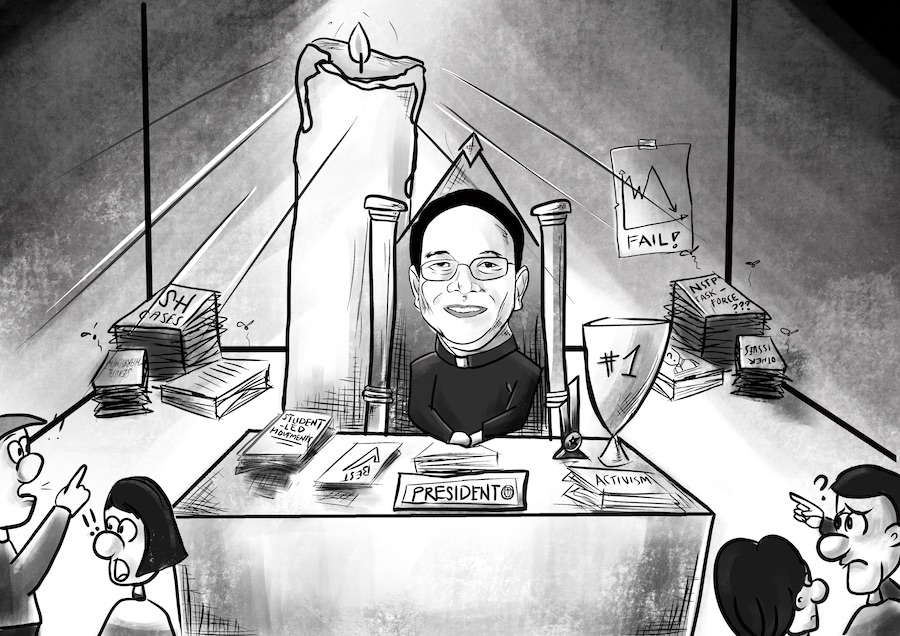
FOR NEARLY a decade, Jose Ramon “Jett” T. Villarin, SJ, carried Ateneo de Manila University’s name as its President and served as the school’s voice throughout its triumphs and tribulations. With his term coming to an end, his accomplishments and shortcomings warrant a reflection on his leadership. Between his lack of transparency on sexual harassment investigations and his condemnation of the late dictator Ferdinand Marcos’ burial in Libingan ng mga Bayani, how should the Loyola Schools (LS) community look back on his legacy?
Neither the school nor Fr. Jett is perfect. In fact, there is no doubt that incoming University President, Roberto “Bobby” C. Yap, SJ, will face his fair share of trials and challenges as well. Therefore, as Fr. Jett steps down for his successor to inherit the post amid these troubling times, critical voices are needed now more than ever to highlight the follies and successes that will guide Fr. Bobby’s judgments in the future.
Missing the mark
During the nine years that he was University President, Fr. Jett was placed under scrutiny for some of his responses to sensitive issues that the school has faced. In the last few years, he insufficiently addressed sexual harassment cases involving members of the LS due to gaps between his statements and the reported truth.
In 2018, he organized a task force to probe disturbing events that students reported to have happened during their National Service Training Program overnight immersion, including a sexual mistreatment incident. Despite his promises to relay the task force’s findings after their investigations, he failed to issue the Ateneo community any updates as of writing.
The year after, a string of sexual harassment reports against LS professors came to light and prompted an on-campus protest on October 15, 2019. In a memo released later that month, he said that no formal complaints were filed against one of the professors in question. However, several months later, a report from The GUIDON revealed that two alumni filed a formal case against the professor in 2016. According to the report, one of the survivors came forward about her experience publicly, which opened the case for review once again. Despite this, survivors and the rest of the LS community are still in the dark about when and how the administration will respond to this discrepancy with finality.
The transparency and accuracy of Fr. Jett’s statements are crucial to reassuring the people he serves during critical times. In those cases, Fr. Jett should have exercised more transparency, carried out his promises, and followed them through with definitive updates for the community.
Tipping the scales
Beyond his imperfections, Fr. Jett has remained steadfast in his progressive stances on several issues past the University’s confines. Just months after his term as University President began, he set the goal to strengthen Ateneans’ holistic formation by pioneering an era of activist leadership—a striking contrast to his predecessor Bienvenido “Ben” Nebres, SJ’s non-confrontational leadership.
For example, in 2010, the Quezon City government provided zone exemptions to the SM Development Corporation’s construction of the Blue Residences condominium. This prompted members of the Loyola Heights community—such as former Sanggunian President Drew Copuyoc—to stage a mass protest in August 2011 as the exemption could have undergone more consultation with affected communities. Fr. Jett expressed his support for this movement through a memorandum, which Copuyoc lauded as a “first for the [school administration] to release a stand on a political issue.”
His response to the approval of House Bill 8858 on second reading in 2019—which initially sought to lower the criminal age of liability to nine—is another case to consider. In Fr. Jett’s statement, he asserted the University’s strong opposition to the bill, saying, “Let us spend more energy and resources on getting children educated, raised in homes of love and safety, capable of entering the workforce in adulthood.”
It was his fearless willingness to confront abuses of power that catapulted the University to use their voice in the years to come—this change in direction is a positive aspect of Fr. Jett’s legacy that many Ateneans will remember him for. Manifestations of this success are seen in the student-led movements against issues such as the late dictator Ferdinand Marcos’ burial at Libingan ng mga Bayani in 2016, the extrajudicial killings during President Rodrigo Duterte’s term, and the recent ABS-CBN shutdown.
Remembering legacies
While there is much to say about Fr. Jett and his legacy as the University President, it is not enough to simply celebrate his accomplishments and blindly praise his image as the “Rock Star President.” As a community that he has led for almost a decade, we must exercise constructive criticism and critical thinking towards his actions. To see both the good and bad sides of Fr. Jett’s term is to see him fairly.
Fr. Jett’s presidency is a reflection of the many great, yet imperfect, legacies that are celebrated by the public. We must examine these leaders at arm’s length, not by brushing past their stains, but by letting their shadows sit beside the candle of their legacy.







